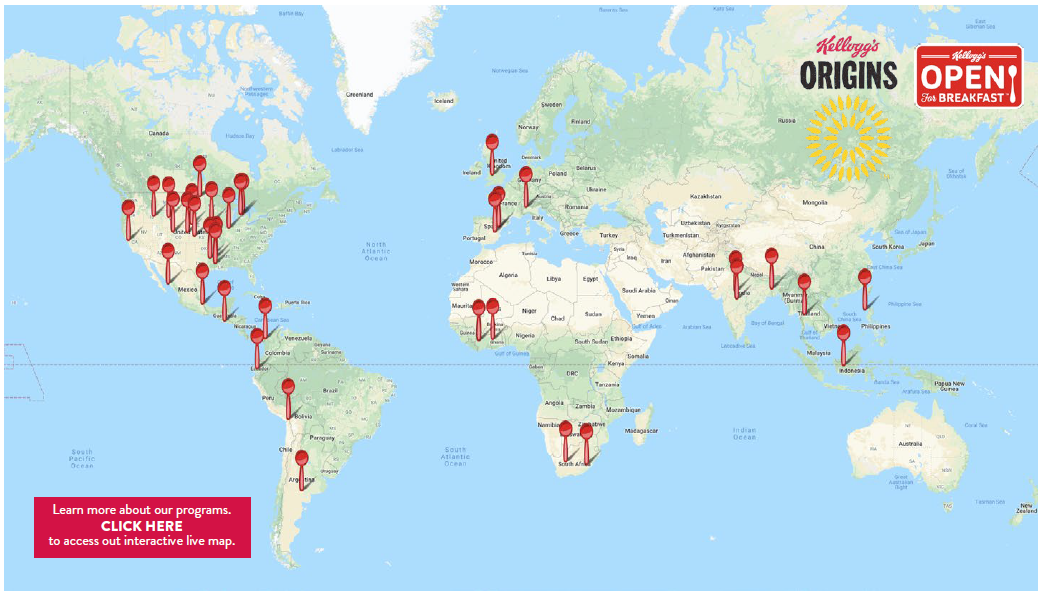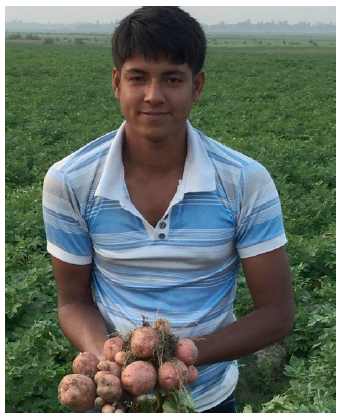ADVANCING SUSTAINABLE AGRICULTURE
Advancing sustainable agriculture
Much of our work in sustainable agriculture is done through our Kellogg’s Origins™ Program that includes more than 40 active projects. These initiatives are built in partnership with suppliers, farmers, scientists and NGOs to increase productivity, improve environmental outcomes and positively impact farmer livelihoods. From 2016 - 2018, Kellogg reached 322,000 farmers, many of whom are women and smallholders. As the map below indicates, Origin’s projects span five continents and each major sourcing location, reaching thousands of farmers and workers.
 |
 |
Sourcing potato flakes in Bangladesh
As one of the poorest countries in the world, Bangladesh has numerous political, economic, social and environmental challenges. However, Bangladesh is the third largest producer of potatoes in Asia, and potatoes are the second largest agricultural crop in Bangladesh. Since 2014, Kellogg has been working with SEBA Limited to help smallholders improve potato farming methods that increase yields and boost incomes. Today, these farmers’ crop yields are 25 to 100 percent higher, and they have a steady source of income since Kellogg has begun purchasing their potatoes for our Pringles® plant in Asia.
Improving conditions for sugar cane workers in Mexico
Kellogg Latin America is taking part in an industry group project to improve cane cutter working conditions in the Veracruz region of Mexico through improvements to water, rest and shade. We have partnered with peer companies, industry-group AIM-Progress and the La Gloria sugar refining mill, along with implementation coordinators ABC Mexico and Kualitoa, to build field shade shelter tents, increase access to potable water, provide additional protective equipment and facilitate training for workers to learn best practices.
 |
Supporting cocao farmers in Ecuador and Ghana
Kellogg is working with all of our cocoa suppliers to ensure they are addressing the human rights and production risks associated with the cocoa supply chain. Specifically in Ecuador, we are partnering with Olam to provide training and materials for 3,000 farmers at farmer field schools. Olam’s expert farmer trainers are building nurseries that are used during the field schools to demonstrate best practices. Respecting cultural norms, a number of the field schools are exclusively for women farmers. Once the field schools are complete, Olam will monitor the management of the nurseries that will be used as demonstration sites for other farmers in the area.
In Ghana, our ongoing support of the CocoaCloud that provides critical information such as weather forecasts and location-specific agricultural advice has helped extend the service that supports climate-smart agriculture decisions to 7500 cocoa farmers, extension advisors and community members. In partnership with the World Business Council for Sustainable Development and others, our goal is to reach one million farmers in Ghana and Côte D’Ivoire by 2024.
Protecting pollinator health
Kellogg helps improve habitats and protect honeybees and other pollinators from harmful exposure to pesticides by encouraging practices such as cover crops. Cover cropping involves growing plants to cover the soil on farmland between the harvest and sowing the next crop to help prevent soil erosion, improve soil structure, increase organic matter, and suppress weeds and pests without application of chemicals.

